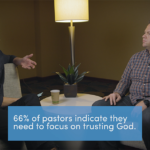
It’s not as simple as copying and pasting certain passages from Scripture into one’s life. Sin easily entangles our view and understanding of love.
By Jesse Masson
Chances are your local supermarket or drugstore has been laden with heart-shaped cards and candies to help convey the message of love from one person to another. Valentine’s Day is upon us and there’s a lot of talk about love.
We’ve even changed the concept of angels to be pudgy, winged babies—celestial match-makers that control our romantic destiny.
But there are actual realities of love that don’t make great greeting cards. Such characteristics of love may even be difficult for us to accept. But these are worth talking about long after the holiday.
As a therapist, I see individuals and couples who have complicated histories and interactions that inform how they define love. It’s not as simple as copying and pasting certain passages from Scripture into one’s life. Sin easily entangles our view of righteousness.
Rarely do I have clients in my office who struggle to understand the concept (head knowledge) of love, but their experiences (heart knowledge) with love have far deeper implications.
For example: Someone who has an abusive parent growing up will struggle to make sense of biblical love—not in definition, but in context of relationships. The juxtaposition becomes whether to hold a definition of love that never applied in life, or to hold distorted, life experiences that are the only perception of love.
This misunderstanding of love applies broadly to all of us—even those in the church.
As a little boy, I remember my mom telling me, “Jesse, your intentions are only as good as they are carried out.” Although she usually referred to my excuses as to why I hadn’t cleaned my room, I have since appreciated its broad application to all areas of my life.
This phrase can be applied to how Christians, can mar the biblical commands to love one another. Furthermore, the misapplications—even with good intentions—can damage the church (community).
All the more damaging is when failed intentions to love are present in the local church structure, which can lead to the gravity and depravity of spiritual abuse. Let’s take a look at healthy ways love is not often conveyed so that we can be more intentional to love one another well.
1. Love is self-caring.
I would say the ability to love others well is indeed hinged upon the ability to healthily love oneself (rest/sabbath, learning to say “no,” gird your safety, etc.).
Too often I hear the (self-deprecating) concern in Christian circles that self-care is actually selfishness. Nothing is farther from the truth! How often does Jesus retreat to be alone, focus on prayer, and rejuvenate His soul?
Ironically, the ability to love oneself and be self-compassionate is the basis for the second greatest command: to love your neighbor as yourself (Matthew 22:37-39).
Loving others well can only result when having the boundaries that maintain mutual respect in any relationship.
You’re not a doormat, nor is love only big enough to choose between you or another person. Sometimes we need to treat ourselves the way we’re expected to treat others.
2. Love gets angry.
That statement probably won’t sit well with some readers. Admittedly, it sounds a little brash as I write it. I commonly hear about Christians feeling torn between feeling hurt or denying their anger in attempt to love (like a “good” Christian).
But the truth is this: If we have love, then we simultaneously should be angry toward that which does not convey love. Love doesn’t demand a plastic parade smile at all times. Love is something we demonstrate in a relationship we value.
When painful elements are neglected or go unprotected we ought to get angry. In fact, righteous anger is always an effort to protect others and preserve biblical and ethical values.
This is exemplified in the biblical account of Jesus flipping over merchant tables at the temple, because they had desecrated (i.e., not loved) the sanctity of the Lord’s house.
Avoid flippantly telling someone they shouldn’t be angry the next time you listen to a broken heart. Anger allows one to clearly identify what’s not valued, and thus, to love more deeply.
3. Love doesn’t forget.
The old saying of “forgive and forget” isn’t rooted in healthiness for self, or others. Although forgiveness is an aspect of grace Christians are commanded to extend, forgetfulness is not.
The knee-jerk reaction might be to hail passages like 1 Corinthians 13 (“love keeps no record of wrong”), but we can only choose to let go of painful events, not control such realities. Jesus commanded his disciple Peter to forgive when wronged, not to forget.
By not forgetting wrongs you suffer, two healthy outcomes are possible. One outcome is that the person who committed the hurt can be held responsible. And the second outcome—by not forgetting—gives someone the opportunity to extend grace through forgiveness.
This may look like the wife who doesn’t excuse her husband’s affair, but can love herself enough to confront his wrong doings and hold him accountable—and love enough to forgive the suffering.
I don’t believe the Bible presents a misunderstanding of love, but I do believe that in our humanity we misapply aspects of love toward oneself and others.
The gospel calls us to view God’s love through Jesus Christ and be imitators of such righteousness. Not one of us is called to enforce legalistic or nuanced alterations.
But our given charge is clear: “To do justice, to love kindness, and to walk humbly with our God” (Micah 6:8). May you do that compassionately for yourself and others.

Jesse Masson
Jesse lives in Kansas City with his wife, Julie, and their three children. In 2020, he started Connected Counseling LLC, a Christian counseling practice that offers professional in-office and teletherapy sessions.











